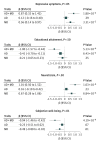Genetic Risk Variants Associated With Comorbid Alcohol Dependence and Major Depression
- PMID: 29071344
- PMCID: PMC6331050
- DOI: 10.1001/jamapsychiatry.2017.3275
Genetic Risk Variants Associated With Comorbid Alcohol Dependence and Major Depression
Abstract
Importance: Alcohol dependence (AD) and major depression (MD) are leading causes of disability that often co-occur. Genetic epidemiologic data have shown that AD and MD share a common possible genetic cause. The molecular nature of this shared genetic basis is poorly understood.
Objectives: To detect genetic risk variants for comorbid AD and MD and to determine whether polygenic risk alleles are shared with neuropsychiatric traits or subcortical brain volumes.
Design, setting, and participants: This genome-wide association study analyzed criterion counts of comorbid AD and MD in African American and European American data sets collected as part of the Yale-Penn study of the genetics of drug and alcohol dependence from February 14, 1999, to January 13, 2015. After excluding participants never exposed to alcohol or with missing information for any diagnostic criterion, genome-wide association studies were performed on 2 samples (the Yale-Penn 1 and Yale-Penn 2 samples) totaling 4653 African American participants and 3169 European American participants (analyzed separately). Tests were performed to determine whether polygenic risk scores derived from potentially related traits in European American participants could be used to estimate comorbid AD and MD.
Main outcomes and measures: Comorbid criterion counts (ranging from 0 to 14) for AD (7 criteria) and MD (9 criteria, scaled to 7) as defined by the DSM-IV.
Results: Of the 7822 participants (3342 women and 4480 men; mean [SD] age, 40.1 [10.7] years), the median comorbid criterion count was 6.2 (interquartile range, 2.3-10.9). Under the linear regression model, rs139438618 at the semaphorin 3A (SEMA3A [OMIM 603961]) locus was significantly associated with AD and MD comorbidity in African American participants in the Yale-Penn 1 sample (β = 0.89; 95% CI, 0.57-1.20; P = 2.76 × 10-8). In the independent Yale-Penn 2 sample, the association was also significant (β = 0.83; 95% CI, 0.39-1.28; P = 2.06 × 10-4). Meta-analysis of the 2 samples yielded a more robust association (β = 0.87; 95% CI, 0.61-1.12; P = 2.41 × 10-11). There was no significant association identified in European American participants. Analyses of polygenic risk scores showed that individuals with a higher risk of neuroticism (β = 1.01; 95% CI, 0.50-1.52) or depressive symptoms (β = 0.87; 95% CI, 0.32-1.42) and a lower level of subjective well-being (β = -0.94; 95% CI, -1.46 to -0.42) and educational attainment (β = -1.00, 95% CI, -1.57 to -0.44) had a higher level of AD and MD comorbidity, while larger intracranial (β = 1.07; 95% CI, 0.50 to 1.64) and smaller putamen volumes (β = -1.16; 95% CI, -1.86 to -0.46) were associated with higher risks of AD and MD comorbidity.
Conclusions and relevance: SEMA3A variation is significantly and replicably associated with comorbid AD and MD in African American participants. Analyses of polygenic risk scores identified pleiotropy with neuropsychiatric traits and brain volumes. Further studies are warranted to understand the biological and genetic mechanisms of this comorbidity, which could facilitate development of medications and other treatments for comorbid AD and MD.
Conflict of interest statement
Figures



Comment in
-
Challenges in the Study of Genetic Variants of Comorbid Alcohol Use Disorder and Major Depression.JAMA Psychiatry. 2017 Dec 1;74(12):1193-1194. doi: 10.1001/jamapsychiatry.2017.3353. JAMA Psychiatry. 2017. PMID: 29071346 No abstract available.
References
-
- Murray CJ, Vos T, Lozano R, et al. Disability-adjusted life years (DALYs) for 291 diseases and injuries in 21 regions, 1990-2010: a systematic analysis for the Global Burden of Disease Study 2010 [published correction appears in Lancet. 2013;381(9867):628]. Lancet. 2012;380(9859):2197-2223. - PubMed
-
- Grant BF, Harford TC. Comorbidity between DSM-IV alcohol use disorders and major depression: results of a national survey. Drug Alcohol Depend. 1995;39(3):197-206. - PubMed
-
- Merikangas KR, Gelernter CS. Comorbidity for alcoholism and depression. Psychiatr Clin North Am. 1990;13(4):613-632. - PubMed
-
- Petrakis IL, Gonzalez G, Rosenheck R, Krystal JH. Comorbidity of alcoholism and psychiatric disorders: an overview. Alcohol Res Health. 2002;26(2):81-89.
-
- Wang JC, Hinrichs AL, Stock H, et al. Evidence of common and specific genetic effects: association of the muscarinic acetylcholine receptor M2 (CHRM2) gene with alcohol dependence and major depressive syndrome. Hum Mol Genet. 2004;13(17):1903-1911. - PubMed
MeSH terms
Substances
Grants and funding
LinkOut - more resources
Full Text Sources
Other Literature Sources
Medical

